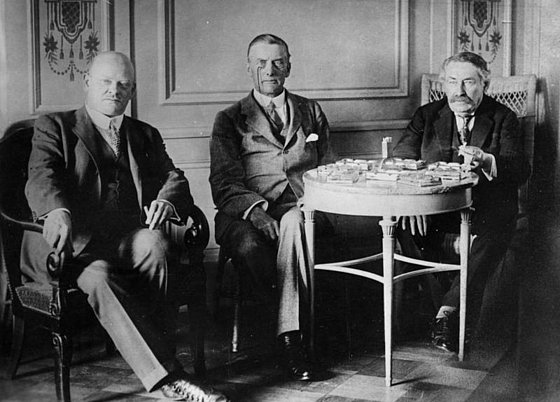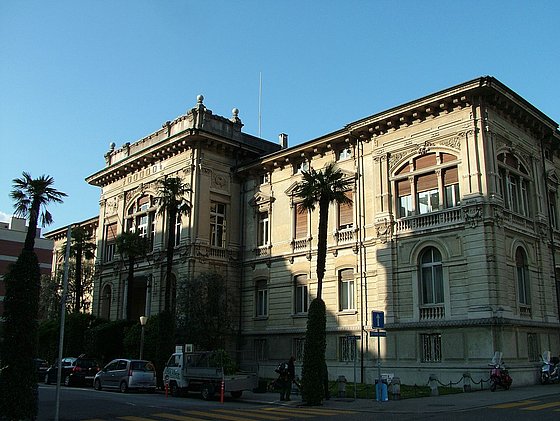
The Locarno Treaties
Apl. Prof. Dr Ewald Grothe / History
Photo: UniService Third Mission
The Locarno Treaties
Historian Ewald Grothe on the quest for a lasting peace solution in Europe after the First World War
In October 1925, the Locarno Treaties symbolised the quest for a lasting peace settlement in Europe after the First World War. Germany's reparation payments had already been regulated by the Dawes Plan of 1924. Why was the signing of this treaty so important?
Ewald Grothe : The Locarno Treaties were important for regulating international security issues a few years after the end of the First World War. This was particularly important for Franco-German relations, as France saw itself and its borders threatened by violations of the disarmament provisions of the Treaty of Versailles by the German Reich and wanted to negotiate security guarantees with England and Belgium in 1924/25 without German participation. In short, there was a French interest in "security against any German intentions to attack".
Which countries were involved, and who was involved on the German side?
Ewald Grothe : France, Belgium, Great Britain, the German Reich, Italy, Poland and Czechoslovakia were involved. The German delegation was mainly represented by Chancellor Hans Luther and Foreign Minister Gustav Stresemann. Stresemann's closest foreign policy advisor Carl von Schubert worked in the background.

Gustav Stresemann, Austen Chamberlain and Aristide Briand during the negotiations
Photo: CC BY-SA 3.0
What goals was Foreign Minister Stresemann pursuing?
Ewald Grothe: By guaranteeing the border to France, Stresemann also wanted to protect Germany against France and secure the Rhineland as a German possession. To this end, he was prepared to recognise the cession of Alsace-Lorraine to France and the territory of Eupen-Malmedy to Belgium. At the same time, he hoped that by pacifying the international situation in the West, he could endeavour to achieve a long-term peaceful revision of the borders in the East.
The French Foreign Minister Aristide Briand, who has also gone down in history as the chief architect of the Locarno Treaties, took on a decisive task. What did he do?
Ewald Grothe : As foreign minister at the time, Briand was the chief negotiator for the French delegation in Locarno. His close, friendly relationship with Stresemann favoured the negotiating climate - people later spoke of the "spirit of Locarno". Briand held informal preparatory talks with the German Chancellor Luther in Ascona on 7 October.
But even after Locarno, Briand continued to work in favour of a peaceful foreign policy in Europe. Less than a year after Locarno, a Franco-German reconciliation meeting was held with Stresemann in Thoiry near Geneva in September 1926. In 1928, he was the initiator of the Briand-Kellogg Pact, a treaty on the mutual renunciation of war between states.
The treaties are regarded as a decisive moment in European post-war diplomacy. Why?
Ewald Grothe: The treaties represented an important milestone in the restoration of European security and thus initiated a process of international understanding. With the conclusion of the Locarno Treaties, the German Reich was admitted to the League of Nations in September 1926 and thus returned to the international community of nations just eight years after the end of the First World War. Locarno was thus also the decisive argument in favour of awarding the Nobel Peace Prize to Stresemann and Briand.

The former courthouse in Locarno (Via della Pace, 6), where the contracts were concluded
Photo: CC BY 2.5
As a result of these treaties, Germany was admitted to the League of Nations. This was still impossible until 1919. Why was that?
Ewald Grothe : Germany was internationally recognised as the main culprit for the outbreak of the First World War. Article 231 of the Treaty of Versailles, which the German Reich had to sign at the end of June 1919, clearly stated this. This meant that Germany was initially isolated in terms of foreign policy and barely able to act.
The agreement of the Locarno Treaties lasted a good 10 years. What happened next?
Ewald Grothe: In March 1936, Reich Chancellor Adolf Hitler ordered the Wehrmacht to invade the Rhineland, which had been demilitarised since 1930. That was the end of Locarno. For the National Socialists, the 1925 treaties were an obstacle to the violent revision of the Treaty of Versailles, which had been in preparation since 1933.
What significance do the Locarno Treaties still have today?
Ewald Grothe : The treaties themselves only have historical significance today as an example and starting point for peaceful Franco-German relations in the early 20th century.
But Locarno is an important place of remembrance for the peaceful settlement of international conflicts and the contractual guarantee of borders. With its reputation for conciliatory diplomacy, it has come to symbolise a policy of international understanding.
Uwe Blass
Prof Dr Ewald Grothe studied history, public law and legal history in Marburg. He habilitated in 2003 in Wuppertal and teaches modern and contemporary history at the University of Wuppertal. He has been an adjunct professor since 2009. Since 2011, he has headed the Archive of Liberalism at the Friedrich Naumann Foundation for Freedom in Gummersbach. He has been Chairman of the Brothers Grimm Society in Kassel since 2017.
